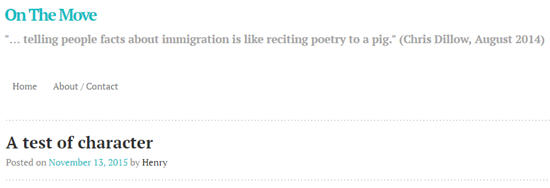A test of character

13 November 2015 - Henry Sherrell
“… telling people facts about immigration is like reciting poetry to a pig.” (Chris Dillow, August 2014)
Imagine being deported to a country where you knew no-one. Where you had no connections. Where the moment you land, you feel like an intruder.
Ian Wightman is a 51 year old man who has lived in Australia for 50 years. Yet he is not an Australian citizen and after spending 15 months in jail, he is now being detained and likely to be deported to the United Kingdom.
Five decades in Australia including time spent in the Australian reserve forces count for naught. Locked up on Christmas Island, it's impossible to understand what Wightman is thinking.
If I didn't know better, I'd assume this was fiction. However fiction doesn't repeat itself.
Take Ko Rutene. A New Zealand man living in Australia who has committed no crime. A decorated war hero who served in Afghanistan and was part of John Key's personal protection. Rutene's visa has been cancelled as he was a member of a motorcycle club. He is being detained in a high security prison.
This scares the shit out of me. With over 27 per cent of Australia's population born overseas, including 1.6m people on temporary visas at any point in time, recent legislative change has created a nightmare scenario where long-term Australian residents are subject to disproportionate, draconian police-state powers.
In October 2014, amendments to the Migration Act introduced mandatory visa cancellation for non-citizens who had spent 12 months or more in jail. Under Section 501 of the Act, applicants visas are cancelled and then as they do not hold a valid visa, subject to mandatory detention. There are no exemptions and the only avenue is one opportunity for the Immigration Minister to overturn the decision. This process is not reviewable, there are no second chances.
This is a black and white approach to a very murky area. While there are undoubted convicted criminals who many would support the detention and deportation of, there are also those mixed up in the arbitrary nature of these laws. There are those, like Ian Wightman, who have a lifetime connection to Australia and amongst the strongest moral claims to remain. Spending 98 per cent of your life in a country - regardless of the crime you commit - creates bonds that should be more difficult to break. There are those, like Ko Rutene, whose life has been upended without due process.
In today's Fairfax papers, the New Zealand Interior Minister called this a 'frontier approach to justice'. It is hard to find fault with this assessment. We have created a system without discretion where these individual stories will continue to arise. Migration and residency are not black and white but subject to temporal and social norms and experiences. People - particularly migrants - do not live homogenous lives where the law can easily define right from wrong. This is why there are entire sections of migration law which rest heavily on discretion. This is why there are multiple institutions dedicated to due process and appeal.
Today this seems almost foreign. With visa cancellations from character grounds up over 500 per cent in the past 12 months, it is time to question why these changes occurred in the first place and walk them back. Reading the google alerts I set myself each morning has become more than a chore it once was. There is a sense of despair. While there may be larger issues going on in the world of migration right now, if we cannot get this basic stuff right, what hope is there for genuinely difficult questions?
I had no idea these laws were being passed last year and I should have paid closer attention. For this I apologise. Even a little bit more attention shined at the time may have led to a different outcome. Perhaps naively, I like to think those who did consider them did not expect these outcomes and the opportunity exists to redress such unfair treatment of people who have given so much to Australian life.
Read Henry Sherrell's blog.